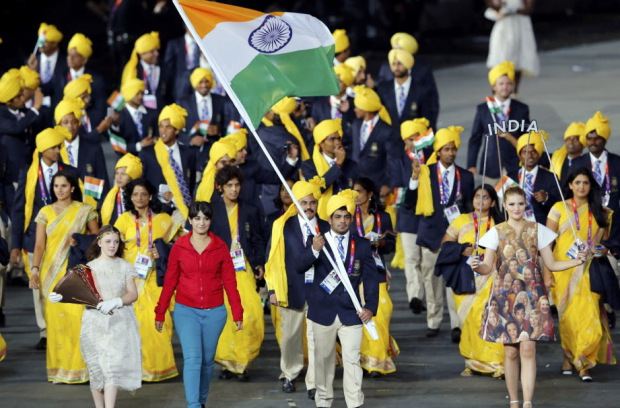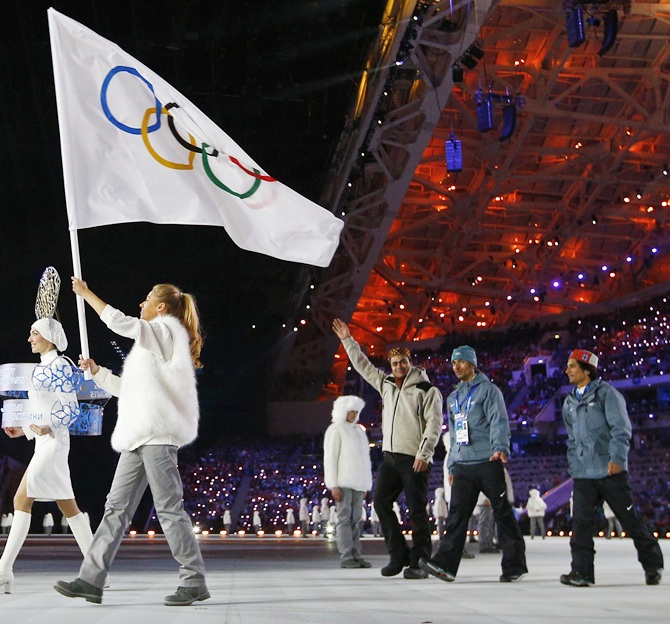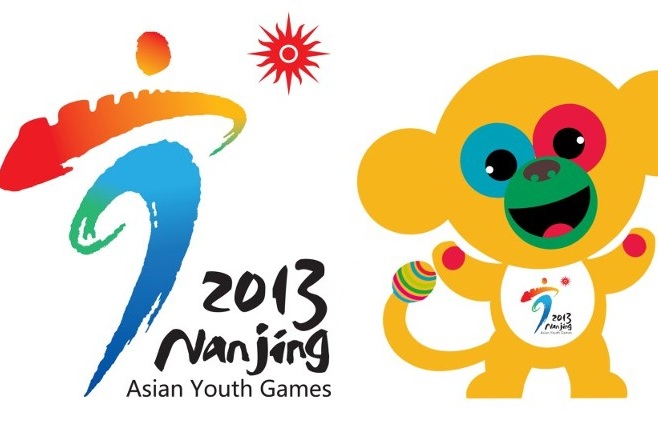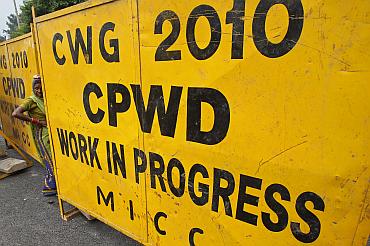 | « Back to article | Print this article |
5 most embarrassing moments in India's sporting history
India is waking up to its sporting potential, but, in recent times, so is the nation’s embarrassment when it comes to its officials.
Take a look at the most embarrassing moments in Indian sport.
A woman gatecrashed India's parade at the Olympic opening ceremony of the London Olympics 2012 and walked beside flag-bearer Sushil Kumar in the Indian contingent. The country's officials were miffed and took up the issue with the Games' organisers.
- A tale of Indian embarrassment in Glasgow CWG...
- Charges against Indian CWG officials dropped for lack of evidence
Her unwanted presence did not go down well with the Indians. She was a member of the cast from the extravaganza but should not have been with the athletes, London 2012 chief Sebastian Coe said.
Acting chef-de-mission of the Indian contingent Brig P K Muralidharan Raja was understandably agitated that a person who was not part of the delegation was allowed to accompany the team and hog the limelight in the process.
Please click NEXT to read more...
5 most embarrassing moments in India's sporting history
The International Olympic Committee banned the Indian Olympic Association in December 2012 over elections that could result in a tainted official taking over as the only candidate for secretary-general.
The IOC was angered by government interference in the elections and had warned the IOA in a letter of a possible suspension.
India's apex sports body was directed by a Delhi court to hold the elections adhering to the government's sports code, while the IOC wanted the governing body to abide by the Olympic Charter.
The IOC blamed non-cooperation by the Indian government and the IOA for the current situation.
Please click NEXT to read more...
5 most embarrassing moments in India's sporting history
Thee Indians – Shiva Keshavan, Nadeem Iqbal and Himanshu Thakur -- qualified for the 2014 Sochi Winter Olympics but were listed as Independent Olympic athletes, under the banner of the International Olympic Committee.
At the Games' opening ceremony, instead of the Indian flag, they marched wearing the Olympic rings, under the Olympic flag.
India completed its return to the Olympic family when its flag was hoisted at the Sochi Games, five days after the International Olympic Committee lifted its suspension on the Southeast Asian nation.
The IOC lifted the ban on February 11 following fresh elections, allowing it to be represented at the Olympics and bringing the total number of nations competing at Russia's first Winter Games to 88.
Please click NEXT to read more...
5 most embarrassing moments in India's sporting history
Bizarre it may sound, Indian officials claimed the four weightlifters disqualified from the Nanjing Youth Asian Games were allowed to take part in their respective events and only their results were not considered for medals.
A top Indian Weightlifting Federation official said the four lifters -- Chandrika Tarafdar (women's 48kg), Jyoti Mal (women's 53kg), Akshay Bhagwan (men's 62kg) and Manpreet Kaur (women's 63kg) -- even received certificates of participation.
In the result sheet, the weights they lifted were not entered; instead, it was written DSQ.
Participants in athletics and weightlifting were required to be born in 1997 or later to take part in the Asian Youth Games, while in other disciplines those born in 1996 could also take part. All the four Indian weightlifters were 1996-born.
Asian Weightlifting Federation secretary-general Ali Moradi was also quoted as saying by Chinese official news agency Xinhua that the Indians took part but were not considered for medals.
Please click NEXT to read more...
5 most embarrassing moments in India's sporting history
Giving New Delhi a world-class look and enhancing infrastructure ahead of the Commonwealth Games became top priority of the Delhi government in 2010 while dwindling revenue and unprecedented rain posed major challenges to it.
The build up to the event -- biggest in India after the 1982 Asiad -- was blighted by construction delays and preparation went virtually down the wire, raising apprehensions about the city's ability to host the Games.
The government had to grapple with harsh criticism for missed deadlines, complaints of shoddy construction works and allegations of corruption in CWG spending in the run-up to the sporting extravaganza.
The outburst became more intense particularly when an under-construction foot over-bridge outside the main Jawaharlal Nehru Stadium fell off just weeks before the event, injuring 27 labourers.
The army later constructed a Bailey bridge at the site but the collapse saw stepped-up global criticism about Delhi's overall preparation for the October 3-14 Games.
Concerned over negative media publicity leading to lack of public enthusiasm about the Games, Chief Minister Sheila Dikshit had to appeal to people to celebrate the event as a 'national festival' while blaming the absence of coordination and multiplicity of authorities for the delays.




